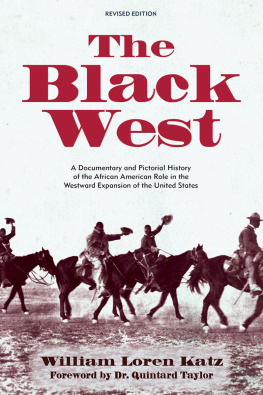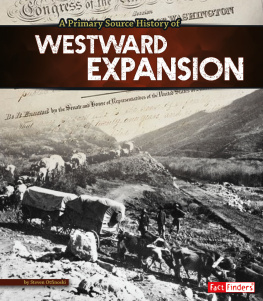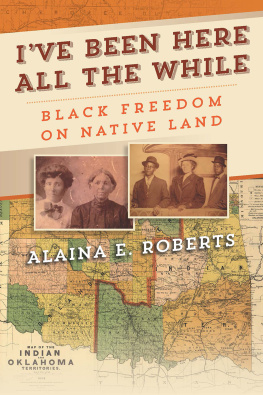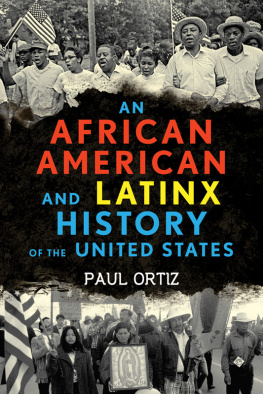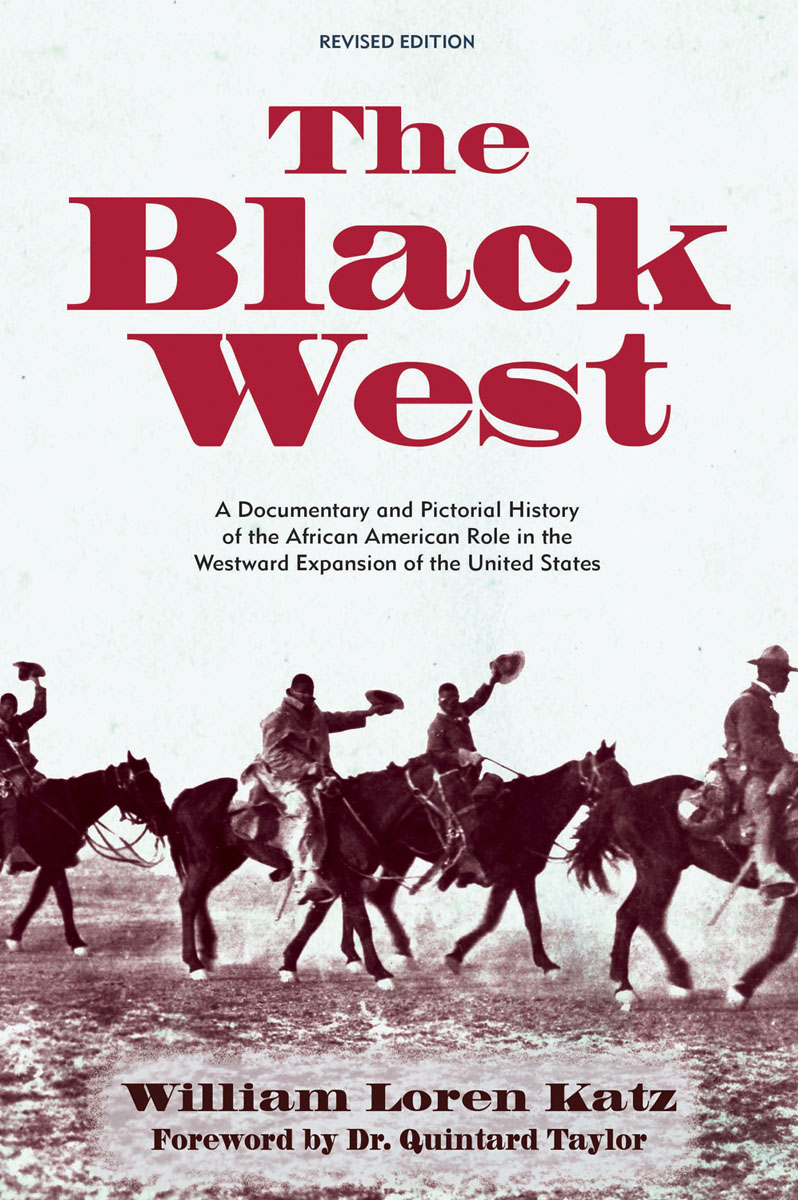
To Dr. Sara Jackson dear friend, teacher, scholar
2019 William Loren Katz
All rights reserved. No part of this book may be reproduced, stored in a retrieval system, or transmitted in any form or by any means, electronic, mechanical, photocopying, recording, or otherwise, without written permission from the publisher.
Library of Congress Cataloging-in-Publication Data
Katz, William Loren.
The Black West / by William Loren Katz.1st ed.
p. cm.
Originally published: New York : Doubleday, 1971.
Includes bibliographical references and index.
1. African AmericansWest (U.S.)History. 2. African AmericansWest (U.S.)Biography. 3. African American pioneersWest (U.S.)History. 4. Frontier and pioneer lifeWest (U.S.) 5. West (U.S.)History 6. West (U.S.)Biography.
I. Title.
E185.925.K37 2005
978.0049607300922dc22 2003061218
ISBN 978-1-68275-226-5
First edition published in 1971.
Printed in the United States of America.
0 9 8 7 6 5 4 3 2 1
Fulcrum Publishing
4690 Table Mountain Drive, Suite 100
Golden, Colorado 80403
800-992-2908 303-277-1623
fulcrumbookstore.ipgbook.com
Other Books by William Loren Katz
The Cruel Years: American Voices at the Dawn of the 20th Century
Black Pioneers: An Untold Story
Black Legacy: A History of New Yorks African Americans
Black Indians: A Hidden Heritage
Flight from the Devils: Six Slave Narratives
The Lincoln Brigade: A Picture History
Black Women of the Old West
Proudly Red and Black
A History of Multicultural America, eight volumes
Exploration to the War of 1812, 14921814
The Westward Movement and Abolitionism, 18151850
The Civil War and the Last Frontier, 18501880
The Great Migrations, 18801912
The New Freedom to the New Deal, 19131939
World War II to the New Frontier, 19401963
The Great Society to the Reagan Era, 19641990
Minorities Today
Black People Who Made the Old West
Breaking the Chains: African American Slave Resistance
The Invisible Empire: The Ku Klux Klans Impact on US History
An Album of Nazism
An Album of the Great Depression
Making Our Way: America at the Turn of the Century
Minorities in American History, six volumes
An Album of the Civil War
An Album of the Reconstruction
The Constitutional Amendments
A History of Black Americans
A Guide to Black Studies Resources
American Majorities and Minorities
Five Slave Narratives
Teachers Guide to American Negro History
Eyewitness: A Living Documentary of the African American
Contribution to US History
Contents
Foreword
In 1971 I began my professorial teaching career at Washington State University. At the time I assumed that my research and teaching interests would follow the work I had done in African American urban history in graduate school at the University of Minnesota. While I was lecturing in an African American history class that fall, an undergraduate student, Billy Ray Flowers, challenged me to understand that African American history was made in the West as well as the South and the North. I took up that challenge and begin my lifelong dedication to studying Black history in the West.
That same year William L. Katzs The Black West: A Pictorial History was released, and it provided a road map for my subsequent research. Then and now the book with its rare photos, succinct narrative, and newly uncovered documents, made clear the impossibility of continuing to overlook this history as so many had done up to that point.
A close look at the structure of my 1998 book, In Search of the Racial Frontier: African Americans in the American West, 15281990, reveals the guiding influence of The Black West. The explorers, fur traders, early settlers, cowboys, and buffalo soldiers quickened my interest and challenged me and many others across the nation, to take note of the people who heretofore had been excluded from definitive histories of the region, from textbooks at every level, and from what at the time shaped popular culture, the movies, and TV.
Three chapters were particularly important in shaping my vision of the West: Slavery in the West, California, and Oklahoma. While The Black West was not the first book to cover these areas, it was my introduction to the people and events that shaped the African American experience west of the 98th meridian. Slavery in the West, for example, exposed me for the first time to the peculiar institution in the trans-Mississippi West. The chapter on California introduced me not only to African American participation in the Gold Rush, but just as importantly to the first significant urban settlements, which would become critical in understanding the contemporary Black West. The Oklahoma chapter made me aware for the first time of the complex and often contradictory relationship between two groups of color, African Americans and Native Americans.
This edition contains a new chapter on the Civil War in the West, exploring the challenges by Black and white westerners faced in responding to the Lincoln Administrations initial intent to wage war for the preservation of the Union without abolishing slavery where it existed. Black and white Western abolitionists refused to concede that point, and soon after the first shots were fired on Fort Sumter, Union officers in the West were incorporating Black soldiers into their ranks. Those accounts should put to rest the idea that the 54th Massachusetts Infantry Regiment included the first Black soldiers in the war. This chapter also complicates the usual Black-white binary in discussions of the Civil War by introducing the conflict in Indian Territory, which proved to be as deeply divided as the entire nation over slavery and seccession. Confederate Indians fought Union loyalists, who also incorporated some of the Black soldiers into their ranks, thus creating the first truly multicultural army in the Civil War.
I was too young and professionally inexperienced to have written the foreword for the first edition in 1971. I am flattered and humbled to be asked to write this now for the sixth edition. The fact that there is a sixth edition is powerful testimony to the continued strength and appeal of The Black West. I have absolutely no doubt that it will inspire others as it did a young assistant professor at Washington State University forty-seven years ago.
Quintard Taylor
Scott and Dorothy Bullitt Professor of American History (Emeritus) University of Washington, Seattle
From the Author:
Tribute to My Favorite Detectives
Last year, as I entered my nineties, I began preparing new editions of some of my forty books. As I worked, I again stared back at the many individuals who provided enormous help throughout my career.
Some had suggested people and events and organizations I had not stumbled on as research topics. Others confirmed areas I was exploring but pointed to neglected material and figures requiring attention. And still others handed me documents and pictures from their personal family collection with a (gentle) Dont forget to use this! command.
Next page
